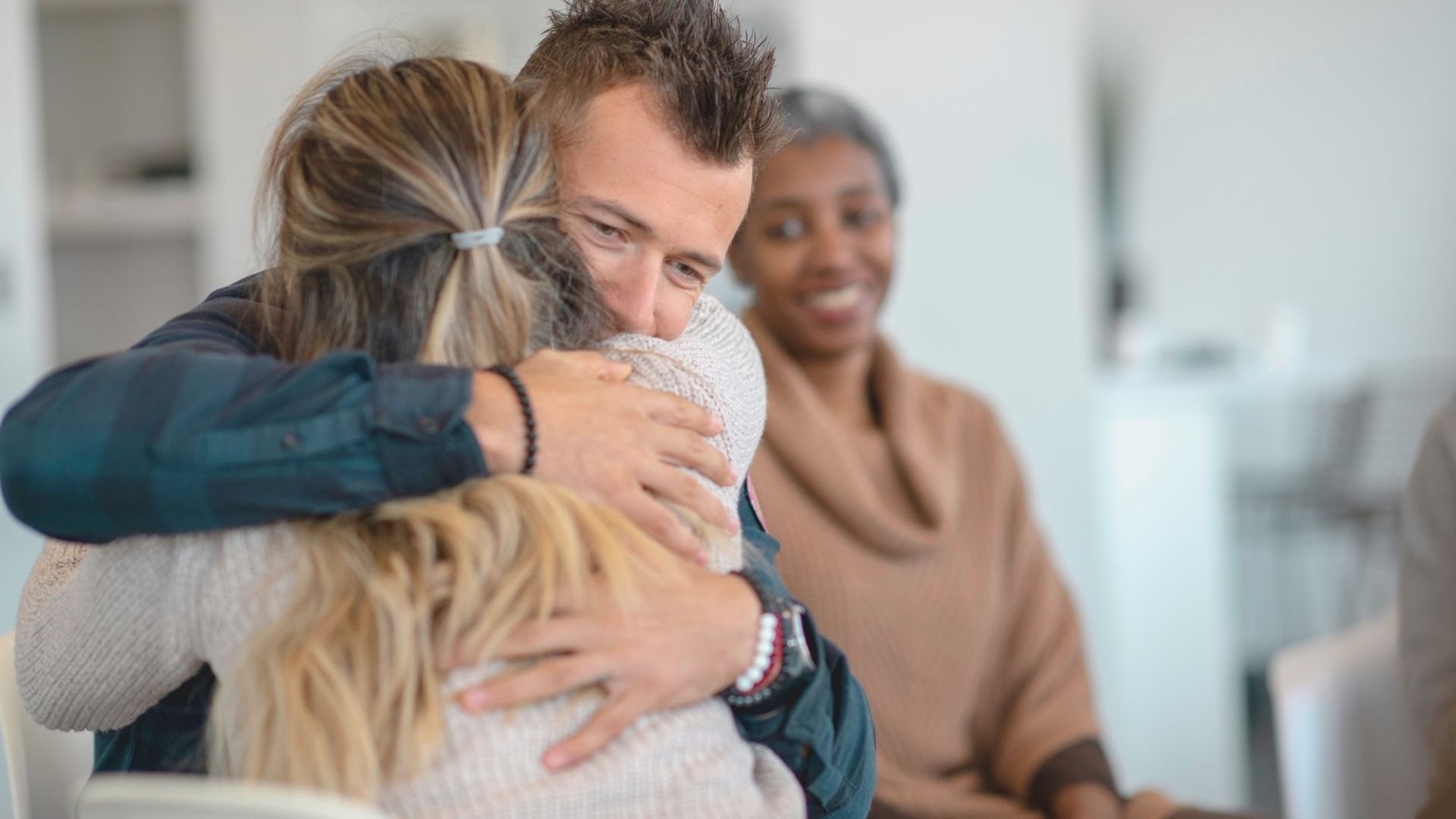Healing Together: The Power of Group Therapy
Group
Therapy
Do you ever feel like you're facing your struggles alone?
Whether it’s grief, anxiety, life transitions, or emotional pain that feels hard to name—group therapy can remind you that you’re not alone. In the presence of others who understand, healing becomes a shared experience.
Group Offerings
Inner Strengths for Outer Changes:
Psychodrama is an experiential methodology that powerfully integrates body and mind. By bringing emotions, thoughts, and memories into action, participants can process events in a deeply embodied way. The psychodramatic stage becomes a space to explore the past, become present to the moment, and rehearse for the future—allowing for healing, growth, and reduced anxiety. Through guided enactments, we can repair unresolved experiences, strengthen our capacity to stay grounded in the now, and prepare for what lies ahead with greater clarity and confidence.
Group Therapist: Jodi Kanter, Ph.D., LCPC, P-RDT
Explore difficult experiences in a supportive environment, guided by the group leader and fellow members, using experiential and action-oriented techniques.
Integrate your emotional and psychological responses to the life-altering changes you've experienced.
Create a safe space to grieve your losses.
Develop a personalized map of your inner strengths to guide you through this uncharted territory.
Foster connection and build a supportive network to navigate these challenging times together.
When: Wednedays from 6:00 PM-8:00PM (EST)
September: 10, 17, 24
October: 8, 15, 22, 29
Where (In Person): 10410 N. Kensington Pkwy. Suite 110. Kensington, MD 20895
Cost: Per session: $75 per 2-hour session or Full Program Payment (7 Sessions): $472.50 (10% Discount Applied)
Regardless of the payment option you select, commitment to all 7 sessions and payment for all 7 sessions is expected.
Meditation Group
Join Paula Catalán Bayón for a 20-minute online meditation practice. We'll sit together in silence, dedicating this time to building mindful presence. The focus will be on your breath and gently witnessing your thoughts without getting caught up in them, helping you cultivate a compassionate inner observer. All are welcome, from beginners to experienced practitioners, as we deepen our present-moment awareness.
Meditation helps:
Increae self awareness and emotional regulation
Increase focus and attention span
Increase compassion towards self and others
Reduces stress
When: Wednesdays 8:00am-8:20am
July: 2, 9, 16, 30
August: 6, 13, 20, 27
Where: Online (Once you register, you will receive the link to the event)
Cost: Donation base
How Can Group Therapy Help?
Group therapy offers powerful insight, emotional support, and opportunities for growth.
As you hear others share similar struggles, you may begin to feel less isolated. Through guided interactions and therapeutic exercises, group therapy helps you:
Identify and shift unhelpful relational patterns
Build empathy and self-awareness
Practice new behaviors in a safe, supportive space
Strengthen your sense of connection and belonging
What to Expect in Group Therapy
Sessions are 120 minutes and our groups are led by trained group therapy experts and incorporate experiential modalities that support the integration of emotional and cognitive processes—fostering adult developmental growth and deeper self-awareness. Including psychodrama (a creative, structured method that uses role play to explore emotional experiences).
You don’t need to “perform” or share more than you’re ready for, your presence is enough. As trust grows, so does the opportunity to:
Explore and express emotions safely
Heal past wounds through group connection
Discover new perspectives and strengths
Experience belonging in the here and now
Psychodrama: A method where participants explore personal challenges by reenacting scenes from life, imagination, or relationships, creating a path toward healing through action and reflection.
When to Consider Group Therapy
You might benefit from group therapy if you're:
Struggling with isolation or loneliness
Experiencing grief or unresolved loss
Repeating painful patterns in relationships
Navigating anxiety, depression, or major life transitions
Seeking deeper emotional awareness and interpersonal growth
What We Treat
Whether you're facing a recent loss or a lifelong pattern of disconnection, group therapy helps make sense of your emotional world—together.
At 3Elements, we support clients working through grief, anxiety, family trauma, life changes, and emotional dysregulation. You don’t need a diagnosis to join. If something feels heavy, the group becomes a safe container to hold, explore, and shift that weight.
Our Rates
-
-
-
-
-
-
-
-
Reduced fee/sliding fee scale services are available on a limited basis.
-
If you do not show up for your scheduled appointment, and you have not notified us at least 24 hours in advance, you will be required to pay a portion of the session ($90 cancellation fee)
-
We provide a superbill that clients can submit to their insurance for reimbursement, with the amount covered depending on their specific plan. Here are some questions you can ask your insurance carrier:
Do I have mental health benefits for marriage counseling?
What is my deductible and has it been met?
How many sessions per calendar year does my plan cover?
What is my deductible for out of network benefits?
How much does my plan cover for an out-of-network provider after I have met my deductible?
What is the coverage amount per therapy session?
Is approval required from my primary care physician?
Flexible Options for Your Journey
Online or In-Person
Get support where you feel most at ease—whether from home or in our Kensington office.
English or Spanish
Work with a bilingual therapist in the language that feels most natural to you.
Cash / Check / Credit Card
Simple and flexible payment options to keep therapy within reach.
FAQs
-
No. You decide what and when to share. Many participants benefit simply from listening. Over time, you may feel safe to contribute more—but there's never pressure.
-
Yes. In fact, some issues—like relationship dynamics, boundaries, and self-worth—can be addressed even more deeply in a group setting.
-
Support groups are often peer-led and focus on shared experiences. Group therapy is led by licensed therapists and incorporates clinical techniques for insight, healing, and transformation.
-
We offer a free consultation to explore if group work feels like a good fit. You can ask questions, learn about the process, and decide if it aligns with your goals.
-
Finding a good therapist is an important step in your healing journey. Like in any profession, there are highly skilled and ethical therapists, but there are also those who may not be the right fit for you. The best way to start is by seeking recommendations from someone who has experienced meaningful healing with a therapist. Firsthand referrals from friends, family, or trusted professionals can help you find someone with a proven track record of effectiveness and integrity.
Beyond recommendations, here are key factors to consider when choosing a therapist:
Integrity & Ethical Standards – A good therapist operates with transparency, professionalism, and strong ethical boundaries. They should uphold confidentiality, avoid conflicts of interest, and prioritize your well-being over their personal or financial gain.
Experience & Specialization – Look for someone with substantial experience in the field and expertise in working with concerns similar to yours. Therapists with diverse experience can tailor their interventions to your specific needs.
Knowledge of Different Modalities – Therapy is not one-size-fits-all. A skilled therapist should be well-versed in multiple therapeutic approaches (e.g., psychodynamic, CBT, attachment-based therapy, psychodrama) and able to adapt their method to suit your personality, history, and goals.
Clinical Insight & Effective Interventions – A strong therapist doesn’t just listen passively but knows how to make thoughtful, strategic interventions that challenge unhelpful patterns, expand self-awareness, and foster healing. They should be able to assess when to offer support, when to encourage action, and when to gently push for deeper reflection.
A Strong Therapeutic Connection – Research consistently shows that the quality of the relationship between therapist and client is one of the biggest predictors of success in therapy. You should feel safe, understood, and respected. If you don’t feel a connection after a few sessions, it’s okay to seek someone else.
-
Therapy is an individualized process, tailored to each person’s unique needs, history, and goals. The length of therapy depends on several factors, including:
Your starting point – Your emotional and mental state when beginning therapy influences the pace of progress.
Your goals – Short-term therapy may be effective for those seeking support through a life transition, while deeper, long-standing challenges—such as childhood trauma, attachment wounds, or complex relational patterns—often require longer-term work.
Family conflict & relational work – When therapy involves family dynamics, addressing conflicts, or repairing relationships, additional time may be needed. Preparing each family member through individual sessions before bringing them together in a family setting allows for more productive conversations and reduces reactivity.
Your level of engagement – Progress depends on how actively you participate, both in and outside of therapy. Applying insights, practicing new behaviors, and integrating changes into daily life accelerate growth.
Logistical considerations – Coordinating sessions for multiple family members, scheduling conflicts, and ensuring each person has space to process their emotions can add to the timeline.
The therapeutic approach – Some structured methods, like Cognitive Behavioral Therapy (CBT), may provide symptom relief in a few months, while depth-oriented therapies, such as attachment-based or psychodynamic therapy, often require more time to address underlying patterns.
For some, therapy is a short-term intervention (a few months) offering tools for immediate concerns. For others, it is a longer journey, fostering deep healing and transformation. Progress is not always linear, but with the right therapist and a strong commitment to the process, meaningful change is possible.
-
Yes, therapy is confidential, meaning that what you share in sessions is private and will not be disclosed without your consent. However, there are exceptions dictated by law where a therapist is required to break confidentiality, including:
Risk of Harm – If there is a credible threat of harm to yourself or others, the therapist is legally obligated to intervene to prevent harm.
Child or Elder Abuse – Therapists must report any suspected abuse or neglect of children, elderly individuals, or vulnerable adults.
Court Orders – If a court subpoenas records or requires testimony, a therapist may be compelled to release certain information.
Danger to the Community – If there is a threat to the safety of the community or a specific individual, a therapist may need to take action.
To ensure greater confidentiality, one step you can take is to opt out of using insurance for therapy. By not submitting superbills or claims through insurance, your therapy remains private and won’t be documented in insurance records, providing an extra layer of confidentiality.
-
Our practice is out-of-network, meaning we do not bill insurance directly. However, many insurance plans offer out-of-network benefits, which can reimburse a portion of therapy costs. Clients should check with their insurance provider to determine their specific coverage.
Key Insurance Terms to Understand:
Out-of-Network Benefits – Some insurance plans will reimburse therapy with providers outside their network, but coverage varies.
Deductible – This is the amount you must pay out of pocket before your insurance begins reimbursing you. For example, if your out-of-network deductible is $2,000, you must cover that amount in medical expenses (including therapy) before your insurance contributes.
Coinsurance – Once your deductible is met, your insurance may cover a percentage of the session cost, while you are responsible for the rest. For example, if your plan covers 60% after the deductible, you would pay the remaining 40% per session.
Superbill Submission – After each paid session, we provide a superbill, an itemized receipt containing all necessary details for insurance claims. Clients can submit this document to their insurance company for potential reimbursement.
How to Check Your Coverage:
Call your insurance provider and ask about out-of-network mental health benefits.
Inquire about your deductible and whether it applies to mental health services.
Ask about coinsurance—what percentage of the cost will be covered after the deductible is met.
Find out how to submit a superbill for reimbursement.
While using out-of-network benefits requires some extra steps, it allows you to choose a therapist based on fit and expertise rather than insurance network restrictions.
-
Yes. We offer a free 30-minute consultation to help you feel supported and see if your therapist is the right fit. Just take the first step.








